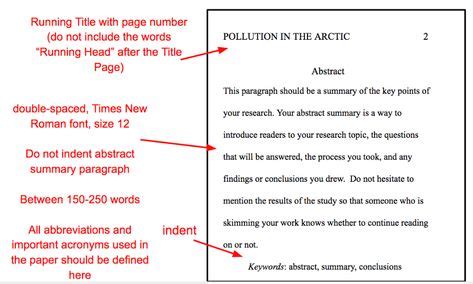Writing An Abstract: 7 Steps With An Example

Writing an abstract is an essential skill for any academic or research paper. It is a concise summary of your paper that highlights the key points and findings. A well-written abstract can make a significant difference in getting your paper noticed, accepted, and cited. In this article, we will discuss the seven steps to writing an abstract with an example.
Step 1: Understand the Purpose of an Abstract
The first step in writing an abstract is to understand its purpose. An abstract is a brief summary of your paper that provides an overview of your research, methodology, results, and conclusions. The primary function of an abstract is to inform the readers about the content of your paper and help them decide whether to read the full text or not.
Step 1.1: Identify the Type of Abstract
There are two types of abstracts: descriptive and informative. A descriptive abstract provides a summary of the paper’s main topic, scope, and purpose, while an informative abstract provides a summary of the paper’s main findings, methodology, and conclusions.
Step 2: Write the Title and Keywords
The title and keywords are crucial elements of an abstract. The title should be concise, informative, and accurately reflect the content of your paper. The keywords should be relevant to your research, and you should include at least three to five keywords.
Step 2.1: Example Title and Keywords
Example Title: The Impact of Social Media on Mental Health
- Social Media
- Mental Health
- Anxiety
- Depression
- Self-esteem
Step 3: Provide Background Information
The background information provides context for your research. It should explain the problem you are addressing, the significance of your research, and the gap in the literature that your study aims to fill.
Step 3.1: Example Background Information
Social media has become an integral part of our daily lives. While it has many benefits, such as staying connected with friends and family, it has also been associated with negative effects on mental health. The rise of social media has led to an increase in anxiety, depression, and low self-esteem among users. However, the literature on the impact of social media on mental health is still limited, and there is a need for further research in this area.
Step 4: State the Research Question or Hypothesis
The research question or hypothesis is the main focus of your study. It should be clear, concise, and specific. It should also be relevant to your research problem and provide a direction for your study.
Step 4.1: Example Research Question
Does social media use have a negative impact on mental health, specifically anxiety, depression, and self-esteem, among young adults aged 18-25?
Step 5: Describe the Methodology
The methodology describes the methods you used to conduct your research. It should include information about your sample, data collection, and data analysis.
Step 5.1: Example Methodology
We conducted a cross-sectional survey of 500 young adults aged 18-25 who use social media regularly. We used the Beck Anxiety Inventory, Beck Depression Inventory, and Rosenberg Self-Esteem Scale to measure anxiety, depression, and self-esteem, respectively. We analyzed the data using multiple regression analysis.
Step 6: Summarize the Results
The results section should provide a summary of your findings. It should include the main outcomes of your study and any significant findings.
Step 6.1: Example Results
Our study found that social media use was significantly associated with higher levels of anxiety and depression and lower levels of self-esteem among young adults aged 18-25. The effect of social media use on mental health was stronger for females than males.
Step 7: State the Conclusion and Implications
The conclusion should summarize the main findings of your study and their implications. It should also provide recommendations for future research or practical applications.
Step 7.1: Example Conclusion and Implications
Our study provides evidence for the negative impact of social media on mental health, particularly among young adults aged 18-25. This has important implications for mental health professionals, social media companies, and policymakers. Mental health professionals should be aware of the potential negative effects of social media use and incorporate this into their treatment plans. Social media companies should consider implementing measures to reduce the negative impact of their platforms on mental health. Policymakers should also consider regulating social media use to protect the mental health of young adults.
Conclusion
Writing an abstract is an important skill for any academic or research paper. By following these seven steps and using the example provided, you can write a clear and concise abstract that highlights the key points of your paper.
FAQs
What is the ideal length for an abstract?
The ideal length for an abstract is between 150 and 250 words. However, the length may vary depending on the requirements of the journal or conference you are submitting your paper to.
Can I use abbreviations in my abstract?
Yes, you can use abbreviations in your abstract, but you should define them the first time you use them.
Should I include citations in my abstract?
No, you should not include citations in your abstract.
What is the difference between a descriptive and informative abstract?
A descriptive abstract provides a summary of the paper’s main topic, scope, and purpose, while an informative abstract provides a summary of the paper’s main findings, methodology, and conclusions.
What should I include in my keywords?
Your keywords should be relevant to your research and include specific terms related to your topic. You should include at least three to five keywords.
